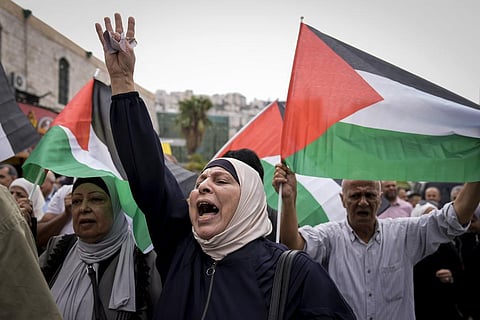

On October 7, more than 4000 rockets rained down on Israel, overpowering the country’s famous ‘Iron Dome’ air defense system. In the chaos that ensued, multiple terrorists crossed the border fencing from the Gaza Strip and moved into Israel, attacking civilians and soldiers and taking them hostage.
After breaking through Israeli barriers with explosives at daybreak Saturday, an estimated 1,000 well-organized gunmen rampaged for hours, gunning down civilians and snatching people in towns, along highways and at a techno music festival attended by thousands in the desert.
The organization behind the attack was Hamas, a militant Palestinian group whose sole purpose is to destroy Israel and return the land to Palestinians.
The surprise weekend attack left a death toll unseen since the 1973 war with Egypt and Syria and fomented calls to crush Hamas no matter the cost.
The war has already claimed at least 1,600 lives, led to gun battles in the streets of Israel for the first time in decades and resulted in the demolition of entire neighborhoods in Gaza in retaliation. Hamas has pledged to kill an estimated 150 hostages if Israel struck civilians without warning.
Hamas is the outfit that rules one of the two main Palestinian enclaves - Gaza. The territory, spread over 365 sq km and surrounded by Israel, Egypt and the Mediterranean Sea, is home to more than two million Palestinians. Hamas is led by Ismail Haniyeh and is one of the two major political factions in the Palestinian territories.
Historical Origins
Hamas’ origin can be traced to a branch of the Muslim Brotherhood, an Islamist political and social movement originating in Egypt, and was active in Palestine in the 1940s and 1970s.
In 1987, imam Sheikh Ahmed Yasin and his aide Abdul Aziz al-Rantisii spun off a part of the Muslim Brotherhood in Palestine to form Hamas.
It exists on the hope and with the aim of leading an armed struggle against Israel ultimately liberating Palestine. Unlike the PLO, Hamas does not recognize the right of Israel to exist, and has outright rejected any compromises or negotiations with Israel and advocates the use of violent jihad to liberate Palestine.
In the 1990s, the PLO and Israel were engaged in a stuttering peace process, which alienated some Palestinians and bolstered Hamas’s popularity as a rejectionist alternative. Hamas participated in the 1996 Palestinian legislative elections and performed well, highlighting its growth.
In 2006, Hamas again won a shock victory in the Palestinian parliamentary elections, taking 74 of the 132 seats, after running a reformist campaign criticizing Fatah for corruption.
However, Israel, the United States and the European Union refused to recognize the Hamas government.
In the next year, tensions between Hamas and Fatah erupted into a brief but bloody Palestinian civil war in Gaza, which ended with Hamas seizing control of the coastal enclave.
Since then, Hamas has ruled Gaza as a de facto government. Israel responded by imposing a blockade on Gaza in 2007, restricting the flow of goods and people in an effort to contain Hamas.
Hamas subsequently fought three major wars with Israel over Gaza in 2008-09, 2012 and 2014.
Hamas continued building up its rocket arsenal and tunnel infrastructure in Gaza while expanding its reach in the West Bank.
Inside Gaza, Hamas governance has been criticized as authoritarian by human rights groups. It has restricted protests and cracked down on dissent.
Hamas remains committed to its foundational goal of establishing an Islamic state in historic Palestine in place of Israel. Its amended 2017 charter accepts the idea of a transitional Palestinian state in the West Bank and Gaza, but without giving up its long-term claims.
Major Supporters
Hamas was supported early on by Saudi Arabia and Gulf states. Now, Hamas’s primary allies are Iran, Qatar and Turkey, which have provided financial and military support over the years.
Meanwhile, Egypt under President al-Sisi has cracked down on Hamas’s cross-border activities since 2013.
Hamas’s ties to Syria and Iran have fluctuated due to disagreements over the Syrian civil war.
In recent years, Hamas has faced growing economic discontent within Gaza due to worsening humanitarian conditions under the blockade. However, it continues to enjoy support from many Gazans due to its confrontation with Israel and the provision of services. Reconciling with Fatah also remains elusive.
For Israel, Hamas continues to pose a major security threat as the rulers of Gaza and retains strength in the West Bank. Dealing with the militant group remains a hugely divisive issue in Israeli politics.
Funding
Hamas has been reportedly receiving monetary funding and weapons from various countries and organizations that share the same ideology as the militant group - to liberate Palestine from Israel.
In its early years, Hamas also received funding from wealthy donors in Gulf Arab states. Its network of social services and charity for Palestinians gave it a broad grassroots appeal compared to the secular Palestine Liberation Organization (PLO).
Iran has been one of the militant group's greatest well wishers, and reportedly provides crucial financial aid as well as weapons.
It also raises funds from organizations and individuals in Gulf Arab states like Saudi Arabia, Qatar and Kuwait.
Hamas invests in private businesses, hotels, real estate and more both within Gaza and internationally. Profits contribute to their funding.
Hamas generates revenues through smuggling activities, such as smuggling weapons, luxury goods, and fuel through underground tunnels along the Gaza-Egypt border. The tunnels have been targeted by Israel and Egypt in efforts to crack down.
Hamas also gets its funding by collecting taxes from the people of Gaza. Its revenues are estimated between USD 200 to 600 million (Rs 16,000 cr to 48,000 cr) per year.